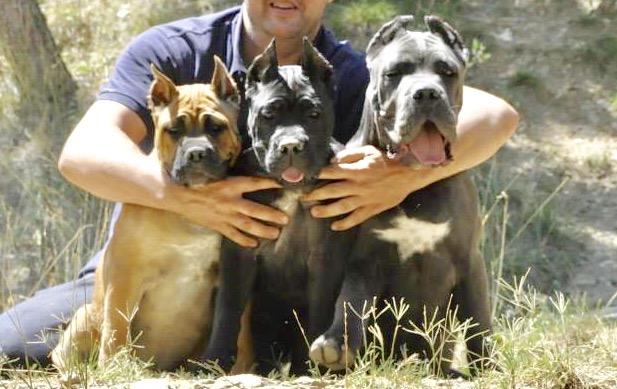The Importance of Socialization in a Cane Corso Puppy
There are many misconceptions about puppy socialization. Some people believe that giving them love and a few cuddles is enough—that the puppy will grow up well-balanced without any additional work. But that’s not the case.
Socializing a Cane Corso (or any other breed) is not optional. It’s a fundamental process that begins from birth and continues through the first few months of life, during which every experience will shape their future behavior.
Let’s break down why this is so important and what roles both the breeder and the owner play in this process.
The Breeder’s Role: The First Stage of Socialization
From birth to three months old, the breeder has a huge responsibility. It’s not just about feeding the puppy and making sure it’s healthy, but also about exposing it to different situations so it gets used to the world around it.
-
Exposure to sounds → From everyday noises like vacuum cleaners or doorbells to louder sounds like traffic or storms.
-
Contact with different surfaces → So the puppy gets used to walking on grass, tiles, carpets, etc.
-
Interaction with humans and other dogs → A puppy raised in isolation may develop fears or insecurities.
-
Early experiences with play and basic obedience → It’s not about training them like adults, but about helping them associate human interaction with positive experiences.
This is where many fail. Some breeders simply leave the puppies in a pen and do nothing more. Then, when the puppy arrives at its new home, the owner ends up with an insecure or fearful dog, or one with behavioral issues.
We see this every day. At our kennel, we work with the puppies daily because we know these first few weeks shape their character for life.
The Owner’s Role: From 3 to 6 Months
This is where the new owner comes in. The family adopting the puppy must continue the socialization process. It’s not enough to think that, since the puppy had a good start, the job is done.
-
Exposure to different environments → Taking the puppy to parks, busy streets, various homes… all this helps them adapt to new situations with ease.
-
Socialization with other dogs → It’s not enough to just see other dogs from afar; controlled encounters are necessary so the puppy learns to interact properly.
-
New experiences every week → Puppies need to face a variety of stimuli, from car rides to vet visits, so they learn there’s nothing to fear.
If the owner skips this step, what was once a balanced puppy may become fearful or overly reactive in new situations.
Genetics Also Matter
Socialization isn’t everything. Genetics play a key role in a dog’s temperament.
Many people don’t realize that puppies can inherit psychological traits from their parents and grandparents. We’re not just talking about physical appearance, but also behaviors, insecurities, and even genetic traumas.
Real example:
If a puppy comes from extremely nervous or insecure parents, no matter how much socialization you do, it will always have a predisposition toward insecurity.
That’s why you can’t just choose any puppy. It’s not only about looks or size. A dog’s temperament comes from its bloodline, and very few people take this into account.
The Impact of Poor Socialization
To understand why all this is so important, think about this:
Imagine a Cane Corso puppy being attacked by a Malinois at just two months old. It’s not just a fleeting scare. Its brain will associate that experience with real danger.
The result? When that puppy grows up, every time it sees a Malinois, its instinct will be to go on the defensive.
The same goes for other fears. A puppy not exposed to loud noises may develop a phobia of storms. One that hasn’t been around strangers may become distrustful and hard to manage.
And all of this could have been avoided with proper socialization.
It’s Not Just About Giving Love
If you think a well-socialized puppy is simply one that has been loved, you’re making a big mistake.
✔️ Socialization is a process.
✔️ It starts with the breeder, but the owner must continue the work.
✔️ Genetics influence a dog’s temperament.
✔️ A poorly socialized puppy can develop lifelong fears and insecurities.


